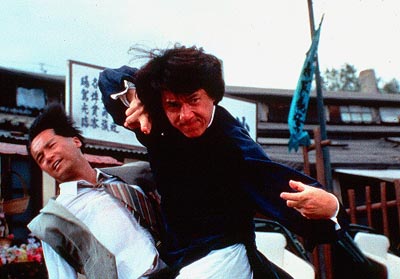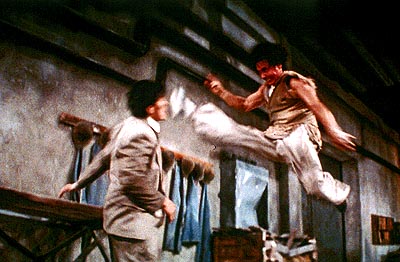

To unsuspecting American audiences, Jackie Chan is one of the hardest working men in movies. Look at how many films he makes a year! In actuality, only two of Chan's movies were made with American audiences in mind. Rush Hour and Shanghai Noon mark a new era in Chan's career; his takeover of the American big screen. People here still have yet to tire of him, so studios are mining his older films for release. And just think about the profits. Usually, all a studio needs to do is redub the film. It was already wildly successful in its initial run, so basically after small expenses including advertising, everything else is profit. The Legend of Drunken Master was originally Drunken Master II, back in 1994. This also may be one of the best "Jackie Chan" type movies ever made.
Basically, there is no plot, yet it took three people, Edward Tang, Tong Man Ming, and Yuen Chieh Chi, to write. The acting is horrible. In fact, Chan looks older than the actors who play his parents (he was forty at the time of filming). This time, the original music remains, unreplaced by hip-hop. American audiences may be shocked at the idiocy of some of the acting, including the sexist way in which Wong Fei-Hung's (Chan) stepmother (Anita Mui, Rumble in the Bronx, Jet Li's The Enforcer) acts. The dubbing is atrocious, and why are they dubbing lines already spoken in English? But this is Asian cinema at its finest, whatever the heck that is. Here, Wong is trying to stop some thieves from smuggling ancient artifacts out of the country. The rest of the plot is pointless, as are the inane jokes and overacting. People criticized the original Drunken Master because of a seeming disregard for alcohol. The hero's martial arts improved with alcohol consumption. So take notice of the anti-drinking message here in this movie.
Drunken boxing is an actual style of martial arts where the person's movements imitate that of a drunk. Thus, his/her opponent has a harder time predicting what moves the person will use. Every time somebody asks Wong for drunken boxing, the music turns really loud and he begins to sway, then the butt kicking begins. The only reason to watch any of Chan's older movies is to watch him fight. He is an unabashed fan of Buster Keaton and Fred Astaire and brings a combination of both to his martial arts along with a touch of Macgyver. He uses anything and everything around him as a weapon, while gleefully pounding the lights out of his opponents. He happily takes on a roomful of men armed with knives and axes, and he still comes out on top. The difference between Chan and other martial arts or action movies is that his violence is comic. Characters in the movie do not get seriously hurt, and few people ever die.
The highlight of The Legend of Drunken Master is the final fight sequence. Getting there is the hard part. The final sequence is twenty minutes long and took nearly four grueling months to film. It is the final showdown between Chan and his real life bodyguard Ken Lo. The two fight in an abandoned steel mill in an amazing display of martial arts that is nearly impossible to describe. They fly across the room at each other, using fire, gasoline, carts, chains, and everything else in the room. Lo can endlessly kick at Chan while standing on one foot, and Chan endures a brutal beating at the hand of Lo Of course, the fact that Chan does all his stunts (sometimes not successfully as seen in the end) makes everything even more awe-inspiring. Director Lau Ka Leung also gets in on the fun, playing Fu Min-Chi, a Chinese hero. He was sixty during filming, yet he and Chan were still able to take on a seemingly endless parade of men in a restaurant, trashing the entire building in the process. The placement of this sequence at the end causes the film to finish on a great note, which is a good thing. After all, most of the rest of the film is horrible.